Two Horizons Commentary (10 vols.)
Digital Logos Edition
Overview
Engage in both concentrated biblical exegesis and meaningful theological reflection with the Two Horizons Commentary series. Without slighting the significance of philological, historical, and social-scientific questions, scholars in this series focus their primary interests on theological readings of texts, past and present. Experts such as Joel B. Green, Peter Enns, and J. Gordon McConville examine 14 books of the Bible—five Old Testament and nine New Testament. They discuss each book in relation to the whole of Scripture, asking what it specifically contributes to biblical theology. The result is a paragraph-by-paragraph engagement with the text that is deliberately theological in focus. This collection includes volumes on Genesis, Joshua, Psalms, Ecclesiastes, Lamentations, Philippians, Colossians, Philemon, 1 and 2 Peter, 1 and 2 Timothy, Titus, and Jude.
- Includes 10 volumes of Old and New Testament commentary
- Provides insight from some of today’s top theologians and biblical scholars
- Contains material perfect for students, pastors, those in the academic world, as well as laity
- Title: Two Horizons Commentary
- Series: Two Horizons Commentary Series
- Publisher: Eerdmans
- Volumes: 10
- Pages: 3,305
- Resource Type: Commentaries
- Topic: Biblical Studies, Hermeneutics and Interpretation
Individual Titles
- Genesis by James McKeown
- Joshua by J. Gordon McConville and Stephen N. Williams
- Psalms by Geoffrey W. Grogan
- Ecclesiastes by Peter Enns
- Lamentations by Robin A. Parry
- Philippians by Stephen E. Fowl
- Colossians & Philemon by Marianne Meye Thompson
- 1 & 2 Timothy and Titus by Robert W. Wall
- 1 Peter by Joel B. Green
- 2 Peter & Jude by Ruth Anne Reese
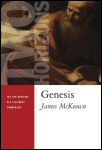
In this commentary, James McKeown treats Genesis as a book of beginnings and a foundational sourcebook for biblical theology. He begins with exegesis of the Hebrew text, highlighting the recurrence of key words, phrases, and themes throughout the book. He also draws attention to passages particularly pertinent to earlier readers either facing or returning from exile, offering a historical context outside a solely Christian perspective. The second half of the book unpacks the numerous theological horizons of Genesis—main unifying themes (descendants, blessing, land); key theological teachings of Genesis (creation, fall, character and image of God, life of faith); and the contribution of Genesis to theology today, including its impact on science, ecology, and feminist theology. McKeown’s Genesis provides a solid examination of a scriptural book that reflects the struggles and hopes of its readers—ancient and modern—and offers encouragement for their walk with God.
James McKeown is vice principal of Belfast Bible College and lecturer in Old Testament at the Institute of Theology, Queen’s University Belfast.
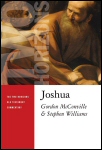
Gordon McConville and Stephen Williams interpret the book of Joshua in relation to Christian theology, providing exegetical commentary and reflection on an often-troubling book that nonetheless plays a key role in the biblical drama of salvation. McConville and Williams address significant theological themes in Joshua, such as land, covenant, law, miracle, judgment, and idolatry. They posit that the theological topics engaged in Joshua are not limited to the horizons of the author and first readers of the book, but that Joshua is part of a much larger testimony that concerns readers yet today.
J. Gordon McConville is professor of Old Testament studies at the University of Gloucestershire, Cheltenham, England.
Stephen Williams is professor of systematic theology at Union Theological College, Belfast, Northern Ireland.
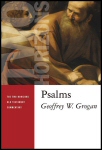
Geoffrey Grogan tackles the growing field of Psalms research and presents an accessible theological treatment of the Psalter. He begins by surveying and evaluating the main scholarly approaches to Psalms and then provides exegesis of all the psalms, emphasizing their distinctive messages. Grogan follows with a full discussion of the Psalter’s theological themes, highlighting the implications of its fivefold arrangement. He considers the massive contribution of the Psalter to biblical theology, including the way the psalms were used and interpreted by Jesus and the New Testament writers. The volume closes with an analysis of the contemporary relevance of the Psalms and a step-by-step guide to preparing a Psalms sermon, based on Psalm 8.
Geoffrey W. Grogan is a lifelong theological educator. His previous works include commentaries on Isaiah, Mark, and 2 Corinthians and books on the Trinity, Christology, and the theology of the Psalms.
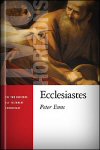
Ecclesiastes is an Old Testament book with a long history of diverse and contradictory interpretations. Even basic questions—who wrote the book, when, and for what purpose—perennially plague scholars. The book’s theological message is likewise elusive, hidden in riddles and convoluted trains of thought that twist and turn back upon themselves.
In this expert commentary on Ecclesiastes, Peter Enns neither disregards nor attempts to resolve the book’s many theological tensions and ambiguities. Rather, he shows how these form the backdrop against which the author struggles to show readers the proper path forward in their journeys of faith—remaining true to the tradition to “fear God and keep the commands” despite the apparent futility of human existence.
Peter Enns is currently senior fellow in biblical studies at the BioLogos Foundation. Previously, he has taught at Westminster Theological Seminary, Harvard University, Princeton Theological Seminary, and Fuller Theological Seminary. His books include Incarnation and Inspiration: Evangelicals and the Problem of the Old Testament and (with Tremper Longman III) Dictionary of the Old Testament: Wisdom, Poetry, and Writings.
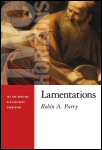
In this volume, Robin Parry not only builds on traditional scholarship to interpret the book of Lamentations within its ancient context but also ventures further, exploring how the book can function as Christian Scripture. Parry provides the first systematic attempt to read Lamentations in light of the cross and resurrection—as Israel’s Holy Saturday literature, filled with the cries of those caught between the death of Jerusalem at the hands of the Babylonians and its rebirth. While Lamentations has been sadly neglected by a culture averse to grief and tragedy, this anguished poetry of pain—especially when read through the lens of Christ’s agony and death—has much to teach us about life, God, and the right response to human suffering.
Robin A. Parry is former editorial director of Paternoster Press, Carlisle, UK. His books include Old Testament Story and Christian Ethics, Universal Salvation? The Current Debate, and Worshipping Trinity: Coming Back to the Heart of Worship.
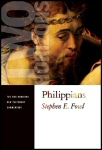
In this fine new commentary on Paul’s letter to the Philippians, Stephen Fowl notes that for the great premodern commentators of the Christian tradition, the literal sense of Scripture is always regulated by theological concerns. Thus, unlike commentaries that simply append theology to historical criticism, Fowl’s volume displays disciplined attention to the text of Philippians in ways that enhance rather than frustrate theological inquiry. While Fowl engages the great scholars of the past, John Chrysostom and Thomas Aquinas among them, he also draws a novel theology of friendship from Paul’s letter and unpacks how the teachings of Philippians might be embodied today by Christians in the West.
Stephen E. Fowl is professor of theology at Loyola College in Maryland. His previous books include The Story of Christ in the Ethics of Paul, Reading in Communion (with L. Gregory Jones), and Engaging Scripture.
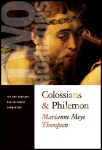
Colossians and Philemon have traditionally been overshadowed by other New Testament texts thought to express Pauline theology more clearly. In this notable commentary, however, Marianne Meye Thompson shows how these two epistles provide a unique formulation of the gospel in terms of creation and reconciliation rather than justification by faith. In Colossians she finds an overarching narrative of the Bible’s grand creation-redemption story and an important emphasis on the relationship between creation and Christology, while her exploration of Philemon casts brighter light on the significance of Paul’s familial metaphors for the church and the meaning of new humanity in Christ. Throughout her work on these two epistles, Thompson continually connects her insights to theological concerns, making this volume an excellent addition to the Two Horizons series.
Marianne Meye Thompson is George Eldon Ladd Professor of New Testament at Fuller Theological Seminary, Pasadena, California, and an ordained minister of the Presbyterian Church. Her previous books include commentaries on the Gospel of John and the Johannine epistles.
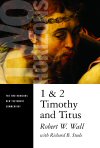
This theological commentary on 1 & 2 Timothy and Titus by Robert Wall powerfully demonstrates the ongoing relevance and authority of the Pastoral Epistles for the church today. Wall uniquely employs an apostolic “Rule of Faith” methodology for interpreting these texts as sacred Scripture. Three successive historical case studies by Richard Steele vividly instantiate key themes of the Pastorals. This innovative yet reverent volume will help revive the interest of students, pastors, and other Christian leaders in the Pastoral Epistles.
I commend Rob Wall for offering us, and the wider church, his canonical readings of the Pastoral Epistles. Rob does not shy away from the many tough passages in these letters, always trying to present what he sees as the “plain sense” of the text in relation to other historical, ecclesial, and cultural understandings. The combination of commentary and reading by the ‘rule of faith’—supplemented by three interesting case studies—provides a thorough canonical understanding of these crucial letters from the standpoint of one who is immersed in what it means to understand the Bible as the church’s book.
—Stanley E. Porter, president, dean of theology, and professor of New Testament, McMaster Divinity College
Those of us who are long-standing admirers of Rob Wall’s work will recognize that the Pastoral Epistles, with all of their critical baggage, provide the perfect backdrop for his canonical approach to Scripture. Wall never shrinks back from crucial questions. Nevertheless, he carefully and confidently interprets the Pastorals as full members of the canon. His readings are theologically apt and lively, shaped and regulated by the church’s faith.
—Stephen Fowl, chair of the department of theology, Loyola College
Robert W. Wall is Paul T. Walls Professor of Scripture and Wesleyan Studies at Seattle Pacific University.
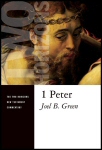
Even though the letter of 1 Peter has sometimes been overshadowed by Paul’s many New Testament letters, it is nonetheless distinctive for the clarity with which it presents the Christian message. In this volume Joel Green offers a clear paragraph-by-paragraph analysis of 1 Peter and, even more, unpacks the letter’s theology in ways that go beyond the typical modern commentary. Following Green’s paragraph-by-paragraph commentary is an extended discussion of the “theological horizons” of 1 Peter. Throughout his study Green brings the message of 1 Peter into conversation with Christian theologians—ancient and contemporary—so that the challenge of this letter for Christian faithfulness can be heard more clearly today.
Joel B. Green is professor of New Testament interpretation and associate dean for the Center of Advanced Theological Studies at Fuller Theological Seminary, Pasadena, California.
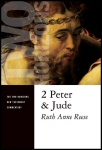
Ruth Anne Reese explores the theological and literary meaning of 2 Peter and Jude with an emphasis on theology for the church today. She seeks to meld together the best tools derived from the disciplines of both biblical studies and theology. Reese’s 2 Peter and Jude begins with a general introduction to the two books and proceeds to look at each text, exploring the meaning of particular words and illuminating the text with elements of history, sociology, and literary study. The themes of each book—and how they are played out throughout the biblical canon—are examined from an explicitly theological angle. Reese brings together insights from the best of biblical scholarship with the work of theologians, both contemporary and ancient. The combination of disciplines leads to new insights on such issues as judgment, community living, and the relationship between faith and ethics.
Ruth Anne Reese is associate professor of New Testament at Asbury Seminary, Wilmore, Kentucky. She is also the author of Writing Jude: The Reader, the Text and The Author in Constructs of Power and Desire.